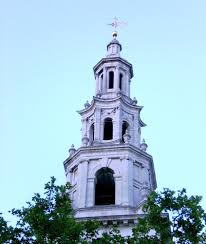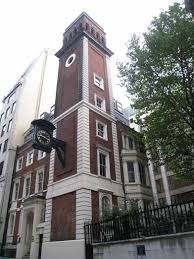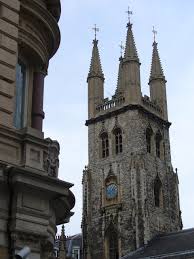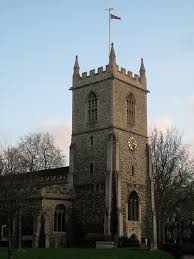I’ve been picking a few of our oranges and this song came to mind.
"Oranges and lemons,
Say the bells of St. Clement's.
You owe me five farthings,
 Say the bells of St. Martin's.
Say the bells of St. Martin's.
When will you pay me?
Say the bells of Old Bailey.
When I grow rich,
Say the bells of Shoreditch.
When will that be?
Say the bells of Stepney.
I do not know,
Says the great bell of Bow.
Here comes a candle to light you to bed,
And here comes a chopper to chop off your head!
Chip chop chip chop - the Last Man's Dead."

I remember it as a game singing the song at birthday
parties. The song is sung with two people (usually adults) facing each, holding
their hands together and up in front of each other forming an arch. Then the
children all file between the adults through the arch. The challenge comes
during the final lines:
Here comes a
candle to light you to bed.
Here comes a
chopper to chop off your head.
(Chip chop, chip
chop, the last man's dead.)

On the last word, the people forming the arch drop their
arms to catch the child currently passing through, who is then "out" and
would then stand behind one of the people forming the original arch.
Alternative versions of the game include: children passing
through in pairs and those caught "out" by the last rhyme may form
additional arches next to the existing one. In this way, the series of arches
becomes a steadily lengthening tunnel through which each set of two players
have to run faster and faster to escape in time; and, children forming
"arches" may bring their hands down for each word of the last line. It
was often the case, in Scottish playgrounds, that children would pair into boy
and girl and the ones "caught" would have to kiss.
The words to "Oranges and lemons" have always been
a little strange and have a sinister historical connotation.
The exact date of origin is unknown but there was a Square
Dance called 'Oranges and Lemons' dating back to 1665, unfortunately there are
no known record of the lyrics which accompanied the dance but it’s likely that
the words were similar to that of the nursery rhyme. The neighbourhood names
relate to some of the many churches of London and the tune that accompanies the
lyrics emulates the sound of the ringing of the individual church bells.

The game of 'Oranges and lemons' which culminates in a child
being caught between the joined arms of two others, is thought to be the act of
chopping off their head! The reason for the sinister last three lines of the
lyrics are easily explained, they were added to the original rhyme, probably by
children! This addition dates to sometime before 1783 when The Tyburn Gallows (the
infamous public execution gallows - the Tyburn-tree) was moved from Tyburn-gate
(Marble Arch) to Newgate, a notorious prison which housed both criminals and
debtors hence "When will you pay me?” Apparently this move was necessary
to reduce problems caused by the crowds, often exceeding 100,000, gathered
along the execution procession route. This stretched along a three mile route
from Newgate Prison to Tyburn and around the Tyburn tree itself.
 |
| the 'Execution
Bell' |
Newgate Prison
The 'Bells of Old Bailey', or more accurately the tenor bell
of St Sepulchre, had been utilised prior to 1783 to time the executions but
after the gallows had been moved, Newgate prison (now the site of the Old
Bailey) obtained its own bell. As the words to the poem "Oranges and
lemons" indicate the unfortunate victim would await execution on 'Death
Row' and would be informed by the Bellman of St. Sepulchre by candle light
'here comes the candle to light you to bed', at midnight outside their cell,
the Sunday night prior to their imminent fate, by the ringing of the 'Execution
Bell' (a large hand bell) and the recitation of the following :
All you that in the condemned hole do lie,
Prepare you for tomorrow you shall die;
Watch all and pray: the hour is drawing near
That you before the Almighty must appear;
Examine well yourselves in time repent,
That you may not to eternal flames be sent.
And when St. Sepulchre's Bell in the morning tolls
The Lord above have mercy on your soul.
The executions commenced at nine o'clock Monday morning
following the first toll of the tenor bell.
 |
| St Clement Eastcheap |
It’s also a street guide to the old city of London
Oranges and lemons,
Say the bells of St. Clement's.
St Clement Eastcheap, - St Clement is the patron saint of
seamen, which he became due to the fact he was martyred by being cast into the
sea with an anchor around his neck. Records suggest there has been a church on
the site as far back as the 11th Century. Before the Great fire of London
(1666) and current church (built by Wren in 1686), the area was near the
wharves where citrus fruit used to be unloaded.
Citrus fruit was an expensive luxury in Elizabethan
England.
 |
| St Martin Orgar |
You owe me five farthings,
Say the bells of St. Martin's.
St Martin Orgar, again the body of the church was destroyed
in the Great Fire. The tower survived, until it was rebuilt in 1851. The rhyme
relates to the moneylenders who traded nearby. Thus the child singing the song
would borrow money to buy expensive fruit.
When will you pay me?
Say the bells of Old Bailey.
 |
| St. Sepulchre |
St Sepulchre-without-Newgate (opposite the Old Bailey),
is still the number one court in London, but
it was for serious crimes, and the child only owes money. The Old Bailey did
not have its own bell - it refers to the bells of St. Sepulchre-without-Newgate
church and the bell of Newgate prison.
 |
| The Old Bailey |
The bell of St. Sepulchre marked the time (death knell) of
imminent executions until Newgate prison acquired its own bell. The church was
destroyed by the Great Fire of London and rebuilt by Wren in 1671. The medieval
courthouse of London was also destroyed in the Great Fire of 1666 and was
replaced by London's Central Criminal Court which was used during 1673 -1834.
The local name for the court was the 'Old Bailey' which was so-called after the
street in which it was located Bailey Street.
 |
| St. Leonard's Shoreditch. |
When I grow rich,
Say the bells of Shoreditch.
St Leonard's, on Kingsland Road in Shoreditch - now part of
the London Borough of Hackney - Was often frequented by Elizabethan actors as
it was located near to the first purpose built theatre called 'The Theatre' and
also in close proximity to the 'Curtain Theatre'. The current church, rebuilt
in 1740 still has the graves of many actors including William Shakespeare's
friend and builder of the Curtain Theatre, Richard Burbage. The hopeful phrase “When
I grow rich" must have been echoed by many an actor in Elizabethian
England.
 |
| St Dunstan's, Stepney |
When will that be?
Say the bells of Stepney.
St Dunstan's, Stepney High Street has a long traditional
link with the sea and it was once known as the 'Church of the High Seas'. Many
sailors were buried in the churchyard. The phrase "When will that
be?" could possibly refer to wives waiting for sailors to return from
voyages with their fortunes - their wives would have to wait for their return
to receive any wages, but they never knew how long the voyages might be - a two
year wait was not uncommon!
 |
| St Mary-le-Bow |
I do not know,
Says the great bell of Bow.
St Mary-le-Bow, off Cheapside. There has been a church on
this site dating back to before the arrival of the Normans in 1066. The current
building was built by Sir Christopher Wren between 1670 and 1680, after the
Great Fire of London destroyed the previous church. You were considered a
Cockney - a Londerner, if you were born within the sound of Bow Bell.
 Here comes a candle to light you to bed,
Here comes a candle to light you to bed,
And here comes a chopper to chop off your head!
Chip chop chip chop - the Last Man's Dead.
This version was created for the execution of Charles by
Parliament , but the Elizabethian nursery rhyme is much better
Gay go up and gay go down
To Ring the Bells of London Town
"Oranges and Lemons" say the Bells of St. Clements
"Bullseyes and Targets" say the Bells of St.
Margaret's (refer to archery which was practised in the nearby fields.)
"Brickbats and Tiles" say the Bells of St. Giles
(refers to the bricks and tiles made from London clay used by the city
builders)
"Halfpence and Farthings" say the Bells of St.
Martin's
"Pancakes and Fritters" say the Bells of St.
Peter's (this was the area of the original 'fast food' of old London's workers)
"Two Sticks and an Apple" say the Bells of
Whitechapel (Whitechapel Bell Foundry- transportation of bells to other parts
of London drew great crowds and the atmosphere was similar to that of a fair
where of course toffee apples were traditionally eaten)
"Maids in white aprons" say the Bells at St.
Katherine's (main food market before great fire, where women of the early
1600's sold the wares which included meat, game, poultry and fish.)
"Pokers and Tongs" say the Bells of St. John's (by
the Tower of London - used as a treason prison for many years and the refer to
the instruments of torture which were used there!)
"Kettles and Pans" say the Bells of St. Anne's
(refer to the utensils sold by the coppersmiths who worked nearby)
"Old Father Baldpate" say the slow Bells of
Aldgate (Church of St. Botolph's - known as the 'Prostitutes' church' - refers
to "Old Father Bald Pate" relates to Saint Botolph. A bald pate was a
colloquialism used to describe a bald-headed person, and the main client of the
ladies.)
"You owe me Ten Shillings" say the Bells of St.
Helen's (The church was frequented by many rich merchants who lived in the
area. Many operated as a money lenders)
"When will you Pay me?" say the Bells of Old
Bailey
"When I grow Rich" say the Bells of Shoreditch
"Pray when will that be?" say the Bells of Stepney
"I do not know" say the Great Bell of Bow
Gay go up and gay go down
To Ring the Bells of London Town






.jpg)
.jpg)
.jpg)
.jpg)
.jpg)
.jpg)
.jpg)
.jpg)
.jpg)
.jpg)
.jpg)
.jpg)
.jpg)
.jpg)
.jpg)
.jpg)
.jpg)
.jpg)
.jpg)
.jpg)
.jpg)